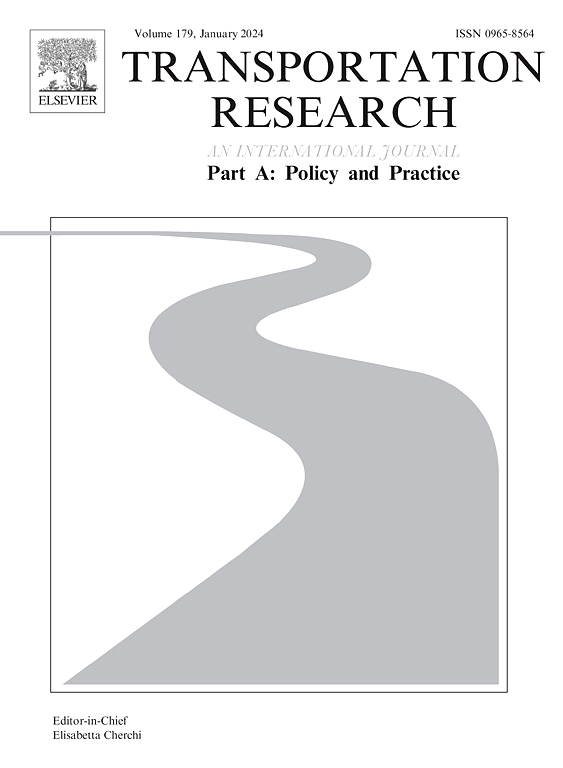利用基于活动的可达性评估自动驾驶汽车对住宅位置分布的影响:日本地区案例研究
IF 6.3
1区 工程技术
Q1 ECONOMICS
Transportation Research Part A-Policy and Practice
Pub Date : 2024-10-09
DOI:10.1016/j.tra.2024.104281
引用次数: 0
摘要
自动驾驶汽车(AV)有望在未来颠覆交通运输行业。大量研究工作致力于研究其潜在影响。然而,现有文献对其长期影响的研究还很有限。为了填补这一空白,本文估算并验证了一个住宅区位选择模型,以日本地区为背景,评估自动驾驶汽车对住宅区位分布的影响。基于活动的可达性是一种基于效用的可达性测量方法,用于反映自动驾驶汽车对短期出行需求的影响。分析以 2040 年为背景,在情景设置中反映了人口减少的影响,同时还考虑了旅行障碍减少等变量,以适应自动驾驶汽车特性的不确定性。四种反车辆方案的模拟结果证实了城市扩张的潜力。结果表明,与基础情景相比,在自动视像情景中,住宅与最近的住宅吸引区(代表地方政府吸引住宅的目标)之间的距离中值扩大了 5.2%至 10.2%。为缓解这一问题,我们采用了两种假定的政策授权。结果表明,对地价提供 10%的补贴可能会有效地缓解相对保守的反车辆通行设置情景下的城市无计划扩展。尽管如此,实施这种政策所需的巨额成本使其实际上不可行,并强调了在预计未来将出现 4 级或 5 级自动驾驶汽车的情况下进行前瞻性规划的必要性。本文章由计算机程序翻译,如有差异,请以英文原文为准。
Evaluating the impact of automated vehicles on residential location distribution using activity-based accessibility: A case study of Japanese regional areas
Automated Vehicles (AVs) are expected to disrupt the transport sector in the future. Extensive research efforts have been dedicated to studying its potential implications. However, the existing literature is yet limited regarding long-term impacts. To fill this gap, this paper estimates and validates a residential location choice model to evaluate the impacts of AVs on residential location distribution in the context of Japanese regional areas. Activity-based accessibility, a utility-based accessibility measure, is used to reflect the AV impacts on short-term travel demand. The year 2040 is set as the backdrop for the analyses, where the effects of the decreased population are reflected in the scenario settings, along with variables such as decreased travel impedance to accommodate the uncertainties in the characteristics of AVs. The simulation results of four AV scenarios confirm the potential of urban expansion. The results demonstrate that, compared to the Base Scenario, the median distances between the residences and the closest Dwelling Attraction Areas, representing as the target for attracting residences by the local government, expand by 5.2% to 10.2% for the AV scenarios. Two hypothetical policy mandates are then applied to alleviate the problem. The results indicate that providing a 10% subsidy to the land price might be effective to mitigate urban sprawl for the scenario with relatively conservative AV settings. Nonetheless, the substantial cost associated with implementing such a policy renders it effectively unfeasible and underscores the need for proactive planning in anticipation of a level 4 or 5 Automated Vehicle future.
求助全文
通过发布文献求助,成功后即可免费获取论文全文。
去求助
来源期刊
CiteScore
13.20
自引率
7.80%
发文量
257
审稿时长
9.8 months
期刊介绍:
Transportation Research: Part A contains papers of general interest in all passenger and freight transportation modes: policy analysis, formulation and evaluation; planning; interaction with the political, socioeconomic and physical environment; design, management and evaluation of transportation systems. Topics are approached from any discipline or perspective: economics, engineering, sociology, psychology, etc. Case studies, survey and expository papers are included, as are articles which contribute to unification of the field, or to an understanding of the comparative aspects of different systems. Papers which assess the scope for technological innovation within a social or political framework are also published. The journal is international, and places equal emphasis on the problems of industrialized and non-industrialized regions.
Part A''s aims and scope are complementary to Transportation Research Part B: Methodological, Part C: Emerging Technologies and Part D: Transport and Environment. Part E: Logistics and Transportation Review. Part F: Traffic Psychology and Behaviour. The complete set forms the most cohesive and comprehensive reference of current research in transportation science.

 求助内容:
求助内容: 应助结果提醒方式:
应助结果提醒方式:


